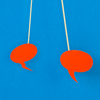1 in 3 Customers Turn to Social First

Social media continues to be a one-way conversation according to new quarterly research from Sprout Social.
Q2 2016 data indicates that brands send 23 promotional messages for every one response given to a consumer. What's more, brands that do respond keep customers waiting an average of 11 hours. Customers, however, expect to hear back from a brand within one to four hours after they send them a message on social. This is important info as Sprout Social reports consumers are increasingly turning to social for customer support with one in three people using it as the first place they contact a brand when they have an issue, and 90 percent of them having used the platforms to communicate with a brand.
Andrew Caravella, VP of marketing at Sprout Social, told Website Magazine that lack of time and resources hinder brands from meeting people's social expectations and as demand and volume grows, providing timely and relevant customer service on social takes effort and commitment from deep within a company, across departments, not just marketing.
"Today, people are more likely than ever to turn to social as their first customer service channel," said Caravella. "Therefore, the questions that come in will likely hit multiple departments within an organization. While the marketing team has traditionally owned social, customer inquiries often involve knowledge from sales, product and HR teams as well. Each company has the responsibility to determine who should be active in social monitoring and when, but it is becoming increasingly common for marketing and support/service teams to be fully integrated in social management, especially through the use of a coordinated social media management platform."
According to Caravella, Sprout Social developed its feature Suggested Replies (comparable to Google's Canned Responses) to help close the gap between what people expect from brands on social and what companies have the resources to deliver.
"Brands need a tool that maximizes time and efficiency," said Caravella. "Suggested Replies is not designed to simply push out automated messages; it was developed to enable social media managers to efficiently respond to their customers in the most considerate way possible, leaving an opportunity for personalization. Each brand has a unique voice and that should always be apparent and top of mind with every Tweet response."

Subscribe to Our Newsletter!
Latest in Social Media










